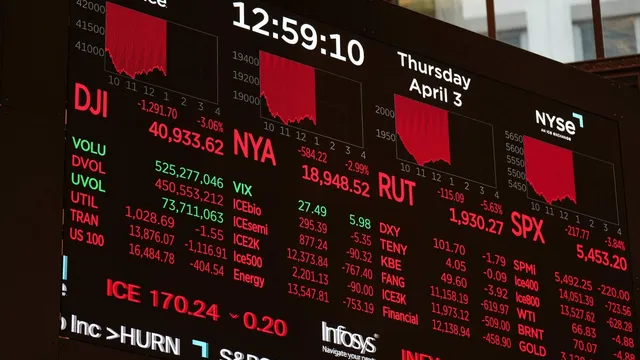
Trump imposes 10% tariff on UK goods, hurting Scottish whisky industry
2025-04-05 05:10- On April 2, 2025, President Trump announced a new 10% tariff on imports from the UK.
- The Scotch whisky industry, valued at £971 million in exports to the US, could face significant losses.
- The announcement has sparked concern among Scottish leaders and calls for negotiations to alleviate the economic impact.
Express your sentiment!
Insights
In a significant development for international trade, President Donald Trump announced a new 10% tariff on imports from the United Kingdom during a press briefing on April 2, 2025. This tariff is part of a broader strategy aimed at rebalancing trade and boosting American manufacturing by encouraging consumers to purchase domestically produced goods over foreign imports. The Scotch whisky industry, which constitutes a vital segment of the UK's exports to the US, expressed discontent, highlighting that the market was valued at approximately £971 million annually. Industry representatives warned that these new levies could severely impact their sales, as a previous 25% tariff imposed during Trump’s first term had already led to substantial losses, estimated around £600 million over two years. Scottish Deputy First Minister Kate Forbes voiced concerns regarding the detrimental effects of such tariffs on the economy, emphasizing the importance of the US as a crucial export market for many Scottish businesses. The Scotch Whisky Association, representing over 90 companies in the industry, echoed these sentiments, indicating disappointment and a desire for the UK government to negotiate a favorable resolution with the US administration. The impact of the tariffs is not limited to just whisky; it also affects exporters of other commodities such as salmon, which is another vital Scottish export. Despite these challenges, the association showed commitment to working towards a mutually beneficial resolution, hopeful that American consumers would continue to purchase Scottish products. The UK government appears prepared to handle the economic implications of the new tariffs, which they consider a challenge but not insurmountable when compared to tariffs imposed on other countries. The Business Secretary acknowledged the disappointment surrounding the announcement but pointed out that the UK is in a relatively better position than some nations facing higher tariffs. The situation remains complex, and it is evident that, while Trump's tariffs are designed to protect US interests, they have sparked significant concern and disappointment among UK firms, particularly in Scotland. The ongoing calls for negotiation reflect an urgent need to address international trade dynamics that could lead to job losses and economic instability if unregulated. As the UK attempts to navigate this new trade landscape, the outcomes of discussions between Scottish leaders and US representatives will be pivotal in determining the future of important sectors of the economy. Therefore, the timely response from the UK government, businesses, and stakeholders will play a critical role in mitigating the impact of these tariffs and fostering continued growth in international trade relationships.
Contexts
The impact of US tariffs on the UK whisky industry has been significant and multifaceted, affecting various stakeholders in the supply chain. Following the implementation of tariffs in October 2019, which sought to address what the US perceived as unfair subsidies to European aircraft manufacturers, the UK whisky sector faced a 25% tariff on exports to the US, one of their largest international markets. This trade barrier resulted in immediate price increases for consumers and a decline in sales, as US importers and retailers passed on the extra costs. The imposition of these tariffs not only curtailed the volume of whisky exports but also hampered the growth potential of UK distilleries that relied heavily on the American market for their revenue streams. Many distillers expressed concern over losing market share to competitors from countries not subjected to similar tariffs, further squeezing profitability. The ramifications of the tariffs extended beyond immediate economic impacts; they also influenced long-term business strategies within the whisky industry. Distillers began to reassess their market dependency and explore diversification strategies to mitigate risks associated with over-reliance on the US market. Some UK distilleries sought to establish or expand their presence in other international markets, including Asia and Europe, which were seen as growth areas, although the immediate financial impact of losing the US market was tough to swallow. While some distillers were able to adapt by increasing production for other markets or adjusting their pricing strategies, many smaller operators struggled to cope with the added strain on their financial viability. Additionally, consumer behavior shifted as US tariffs on UK whisky influenced purchasing decisions. Many American consumers became more price-sensitive, resulting in reduced overall consumption of imported Scotch whisky. As a result of these tariffs, there was a noticeable uptick in interest in domestic whiskey production in the US, as local brands positioned themselves as cost-effective alternatives. This could pose a long-term challenge to the UK whisky industry, as consumers develop preferences for local products rather than imported options, further complicating the recovery from tariffs. In summary, the impact of US tariffs on the UK whisky industry has been profound and complex, affecting both the economic stability of distilleries and the broader market dynamics in the US. Industry players have had to adapt to a challenging environment, rethinking their strategies to cope with barriers imposed by international trade policies. While some distillers have found ways to diversify and potentially mitigate the effects, the overall landscape remains a cautionary tale of how trade disputes can ripple through economies and industries, leading to lasting changes in consumer behavior and market conditions.